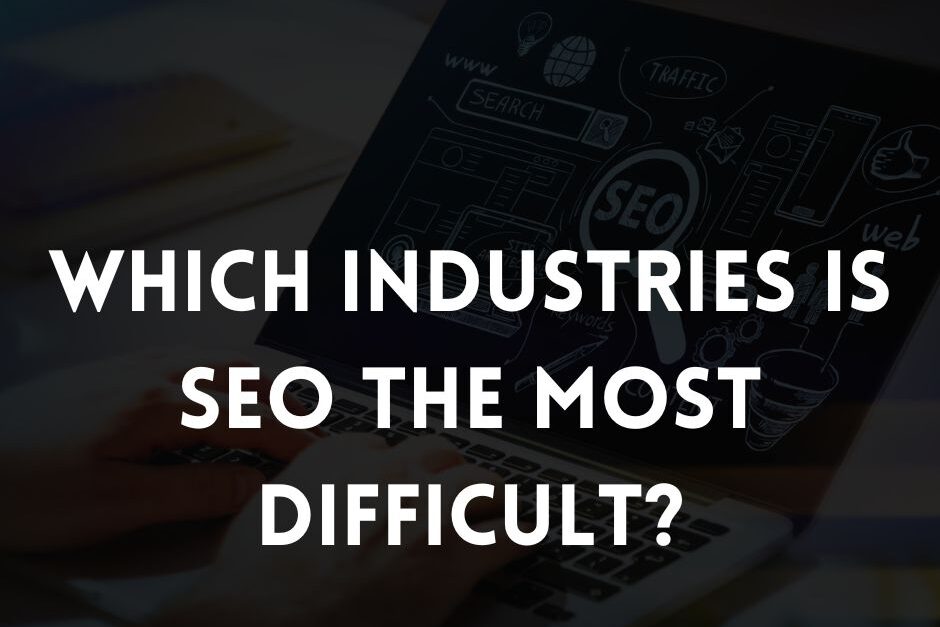
Search Engine Optimization (SEO) is a critical component of digital marketing, helping businesses improve their online visibility and attract organic traffic. However, not all industries are created equal when it comes to SEO difficulty. Some sectors face unique challenges that make ranking on search engines like Google particularly tough. In this article, we’ll explore the industries where SEO is the most difficult and why.
1. Legal Services
The legal industry is one of the most competitive fields for SEO. Law firms and attorneys often target high-value keywords like “personal injury lawyer” or “divorce attorney,” which are extremely competitive. Additionally, the industry is heavily regulated, limiting the type of content that can be published. Local SEO is also crucial for law firms, as clients typically search for services in their area, making geo-targeted keywords highly contested.
Challenges:
- Intense competition for high-value keywords.
- Strict advertising and content regulations.
- High cost-per-click (CPC) for paid ads, driving more competition to organic SEO.
2. Healthcare and Medical Services
Healthcare is another industry where SEO is notoriously difficult. Medical professionals, hospitals, and clinics compete for keywords like “best cardiologist near me” or “affordable dental implants.” The industry is also subject to strict compliance regulations, such as HIPAA in the U.S., which restricts the type of patient information that can be shared online. Additionally, medical content must be accurate and authoritative, requiring input from qualified professionals.
Challenges:
- High competition for local and national keywords.
- Strict compliance and privacy regulations.
- Need for expert-driven, trustworthy content.
3. Finance and Insurance
The finance and insurance sectors are highly competitive, with companies vying for keywords like “best mortgage rates” or “affordable car insurance.” These industries are also heavily regulated, requiring businesses to navigate complex legal guidelines when creating content. Furthermore, consumers often prioritize trust and credibility when choosing financial services, making it essential for companies to build a strong online reputation.
Challenges:
- High competition for lucrative keywords.
- Complex regulatory requirements.
- Need for trust-building and authoritative content.
4. Real Estate
Real estate SEO is challenging due to the hyper-local nature of the industry. Agents and agencies must compete for location-specific keywords like “homes for sale in [city].” The market is also highly saturated, with many agents and platforms like Zillow dominating search results. Additionally, real estate websites require constant updates to reflect current listings, making ongoing maintenance a necessity.
Challenges:
- Hyper-local competition.
- High saturation of agents and platforms.
- Need for frequent website updates.
5. E-commerce
E-commerce SEO is difficult because of the sheer volume of competitors and the constant changes in consumer behavior. Online retailers must optimize for both product-specific keywords and broader category terms. Additionally, e-commerce sites often struggle with technical SEO issues, such as duplicate content, slow page speeds, and poor mobile optimization. Competing with giants like Amazon adds another layer of difficulty.
Challenges:
- High competition for product-related keywords.
- Technical SEO complexities.
- Constant need to adapt to changing consumer trends.
6. Travel and Hospitality
The travel industry is highly competitive, with businesses targeting keywords like “cheap flights to Europe” or “best hotels in Bali.” The industry is also seasonal, requiring businesses to adjust their SEO strategies throughout the year. Additionally, travel websites often face technical challenges, such as managing large amounts of dynamic content and ensuring a seamless user experience across devices.
Challenges:
- Seasonal fluctuations in demand.
- High competition for travel-related keywords.
- Technical SEO challenges with dynamic content.
7. Education and Online Courses
The education sector, particularly online courses and degree programs, is becoming increasingly competitive. Institutions and platforms compete for keywords like “online MBA programs” or “best coding bootcamps.” The industry also requires a focus on long-form, authoritative content to establish credibility. Additionally, the rise of online learning platforms has intensified competition.
Challenges:
- High competition for educational keywords.
- Need for authoritative, long-form content.
- Growing saturation of online learning platforms.
8. Technology and SaaS
The technology and Software-as-a-Service (SaaS) industries are highly competitive, with companies targeting keywords like “best project management software” or “cloud storage solutions.” These industries require a deep understanding of technical SEO, as well as the ability to create content that resonates with a tech-savvy audience. Additionally, the fast-paced nature of the tech industry means that SEO strategies must be constantly updated.
Challenges:
- High competition for tech-related keywords.
- Need for technical SEO expertise.
- Rapidly changing industry trends.
Why Is SEO Difficult in These Industries?
The common thread among these industries is high competition, strict regulations, and the need for specialized content. Additionally, many of these sectors require a strong focus on local SEO, technical SEO, and ongoing content updates. Businesses in these industries must invest in comprehensive SEO strategies, including keyword research, on-page optimization, link building, and content creation, to stay competitive.
Tips for Succeeding in Competitive SEO Industries
- Focus on Long-Tail Keywords: Target less competitive, more specific keywords to attract niche audiences.
- Create High-Quality Content: Publish authoritative, well-researched content that addresses user intent.
- Optimize for Local SEO: Use local keywords, create Google My Business profiles, and gather reviews.
- Invest in Technical SEO: Ensure your website is fast, mobile-friendly, and free of technical issues.
- Build Backlinks: Earn high-quality backlinks from reputable websites to boost domain authority.
- Stay Updated: Keep up with industry trends and algorithm changes to adapt your strategy.
Conclusion
While SEO is challenging in industries like legal services, healthcare, finance, and e-commerce, it’s not impossible. With the right strategy, businesses can overcome these challenges and achieve higher search engine rankings. The key is to understand the unique demands of your industry and invest in a tailored SEO approach that addresses those needs. By doing so, you can stand out in even the most competitive markets.
